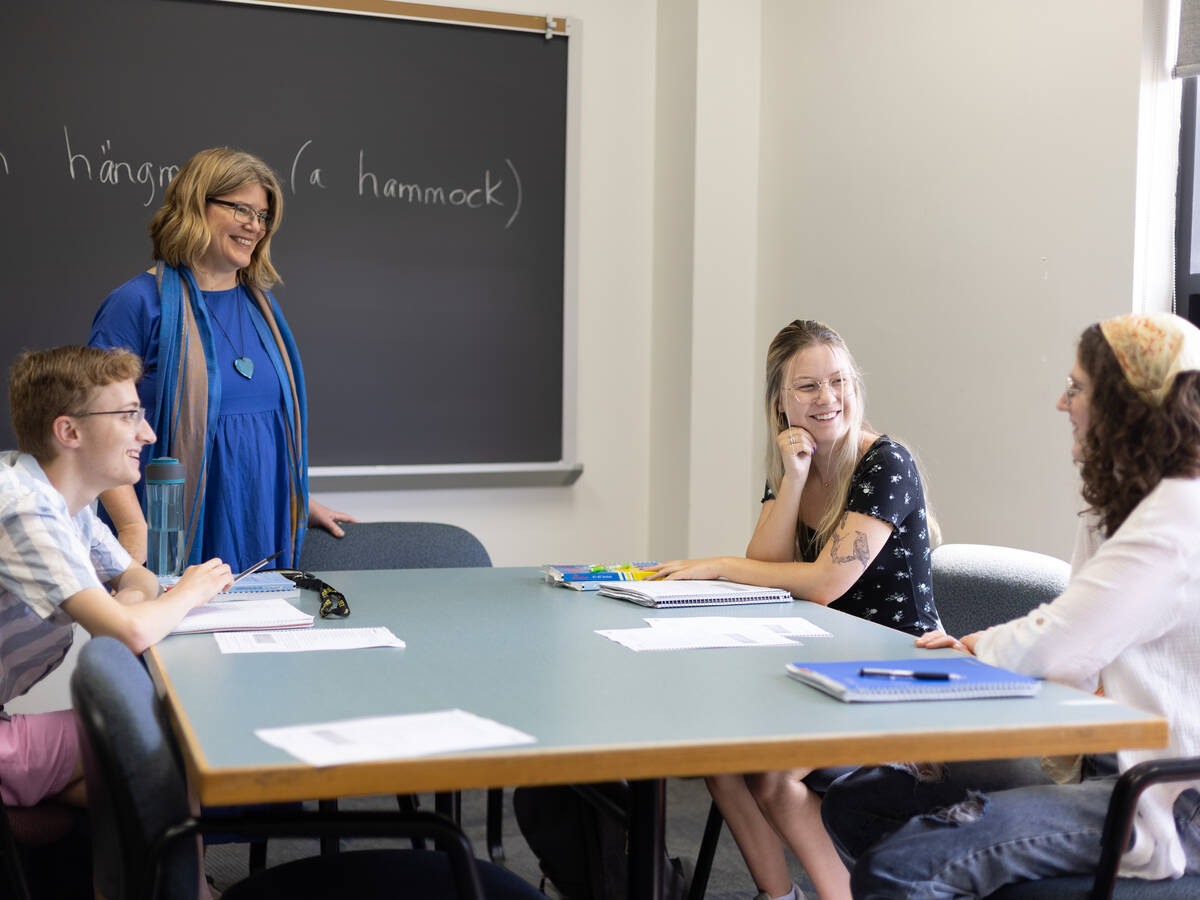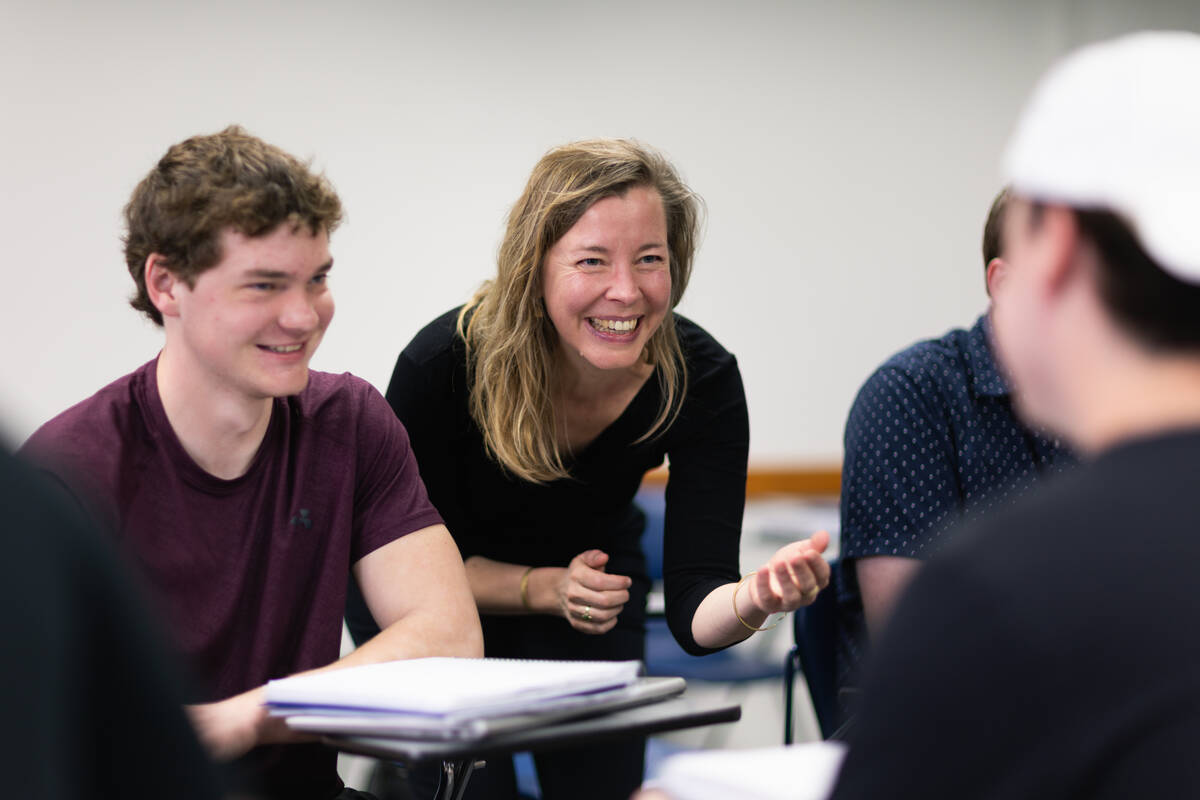About the DepartmentDepartment of Scandinavian Studies

Välkommen to one of the most distinctive and adventurous majors and minors at Gustavus - Scandinavian Studies! We've had an academic presence here since the college was founded, and we've existed as a robust academic program for nearly a half century. Our students journey to the Arctic Circle, connect over "fika" (coffee and treats) at the Swedish House student residence on Thursday nights, and get to know award-winning artists and scholars who visit us every year from the Nordic region.
The Department of Scandinavian Studies explores the Nordic countries' diverse cultures, histories, and roles in the global society. Our Swedish language program is the largest in the United States, and our breadth of courses taught in English showcase the ethnic, cultural, and religious diversity of the modern Nordic region.
Course Catalog Faculty and Staff
Program Features
-
Global Classrooms The Nordic world - its peoples, histories, societies, landscapes, and places - are brought to life in our courses on campus and those taught abroad. Our department hosts numerous visiting scholars, artists, writers, and performers every year; since 1989, our annual Artist-in-Residence program has brought many of the Nordic region's most esteemed contemporary artists to campus and into our classrooms during Out of Scandinavia Week.
-
Model Societies The Nordic countries are often championed for their political transparency, multicultural policies, environmental sustainability, gender equality, children's rights, and social welfare systems; students in our courses parse out and question these topics and conceptualizations.
-
Integrated Studies The field of Scandinavian Studies draws from many disciplines, and many of our courses are cross-listed in the college's interdisciplinary programs in Gender, Women, and Sexuality Studies; Comparative Literature; Peace, Justice, and Conflict Studies; and Film and Media Studies. Our class sizes are small, and faculty work closely with students to help them develop and pursue their own scholarly and career interests.
-
Intercultural Competency Swedish culture and customs are embedded in all of our Swedish-language courses, from beginning to advanced levels, preparing students to spend time in Sweden. In our English-language courses, students find that examining the histories, cultures, and customs of Nordic societies provides them with a nuanced understanding of their cultures of origin and a greater awareness of the global society we all share.
-
Real-World Experience Our students work, study, and conduct research throughout the Nordic region; many win scholarships to carry out research projects in Sweden, participate in the Nobel science camp in Karlskoga, or attend the Nobel ceremony in Stockholm. Our students draw upon their faculty advisors' ample networks in the Nordic region.
-
Humanist Tool Kit Our courses are grounded in the humanities, which provide critical frameworks for understanding human experience through culture - its histories, arts and literatures, philosophies, religions, music, and languages. This training provides critical skills for our graduates who imagine, pursue, and thrive in a wide variety of careers, including diplomacy, international business, law, translation, the arts, education, medicine, and scientific research.
Mission Statement
The Department of Scandinavian Studies explores the Nordic countries' cultures, histories, and their place in the global society. The department offers language and culture courses in Swedish, and a breadth of courses taught in English on Nordic literature, film, culture, and history. The department fosters connections and dialogues across disciplines and beyond campus about the Nordic countries, and actively promotes the College's historical and contemporary connections to Sweden.
Student Learning Outcomes
- Cultural Knowledge
- gain a broad-based knowledge of the Nordic countries historically and today
- gain an appreciation of the Nordic area as a multicultural and multiethnic region
- recognize links between the Nordic countries and the European community as well as the rest of the world
- gain knowledge of literary periods, and the literary and film canon in the Nordic countries
- Linguistic Competency
- acquire near-native fluency in Swedish (or in exceptional cases another Nordic language) in the four competency areas of listening, reading, speaking, and writing
- Communicative and Analytical Skills
- develop critical thinking, writing, and communication skills
- acquire the ability to analyze the Nordic region and its cultural forms and aesthetics, social and political systems, and the countries' roles within the international community
Library Holdings
It is difficult to give an exact number of titles pertaining to Scandinavia because Scandinavian materials are represented throughout the entire library collection. Using only disciplines as a guideline, the following numbers can be arrived at for three major areas: History (DN)--1685 volumes; Fiction (PT)--3956; Scandinavian in the US (E)--169. There are 19 Scandinavian periodicals and 5 newspapers. The Library also offers a wide range of video programs about Scandinavia.
